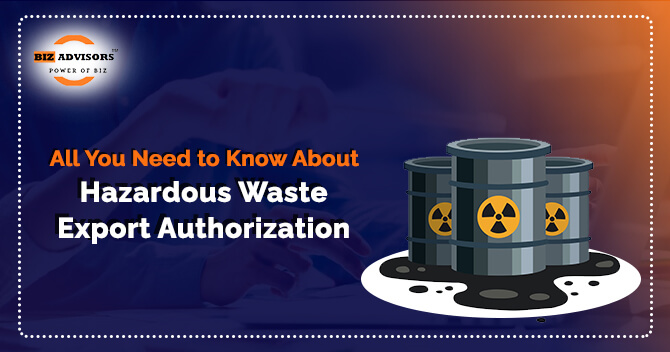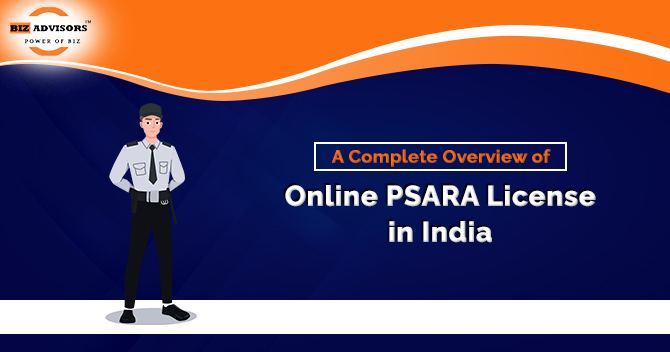Hazardous Waste Export Authorization comprehensively draws a pattern of efficacious management of hazardous waste in a well-organized manner to safeguard the environment from the harmful effects of such pollutants on a wide scale. It assists in creating a healthy environment and also disposing of harmful substances in the form of waste far away from the local communities and public areas. It prepares a regulatory framework for providing authorization to the channelizing units of disposal functioning to export hazardous waste to ensure that the waste is managed in such a manner that it may not harm biological diversity in any manner. With the fast pace advancement of industrialization, ecological sustainability has been hampered due to the unregulated discharge of hazardous waste. It vitiates the beauty of the environment on a large scale. Therefore, it is the need of the hour to shift our focus on uplifting the standards of biological diversity to maintain ecological sustainability. Biodiversity can be enhanced only when Hazardous Waste Export Authorization would be regulated effectively at a global level. In this blog post, multifarious aspects of Hazardous Waste Export Authorization have been delineated in a sophisticated manner.
Hazardous Waste Export Authorization
The Ministry of Environment and Forests is in charge of overseeing the transboundary transportation of all dangerous materials, and it also has the authority to approve their transit via any Indian territory. The garbage that can be exported from India is listed in Schedule III, Parts A and B, and Schedule VI, and it can be done with the Ministry of Environment, Forestry, and Climate Change’s (MoEF&CC) prior consent. Applications for the Hazardous Waste Export Authorization are listed in Schedules III and VI of Part A and will be considered only with the prior informed consent of the importing country. No country is allowed to import hazardous materials for disposal in India. India allows the export of hazardous wastes with the prior informed agreement of the importing countries to operators of disposal facilities or actual consumers of the wastes to ensure that the wastes in question are managed ecologically appropriately.
Advantages
The following are the advantages of Hazardous Waste Export Authorization:-
Resource conservation
· The 3Rs of trash management—Reducing, Reusing, and recycling—are fostered under the Hazardous Waste Authorization.
· We can bring down the amount of waste we create to a reasonable level by making better use of our resources and creating less trash than normal. Be sure to pack.
· Reducing waste would not only benefit the environment, but it would also result in financial savings or decrease disposal expenses.
· As fewer resources must be extracted and there is less chance of contamination, recycling, and reuse of garbage benefit the environment.
Production of energy and environmental quality
· Biomass, manure, or other suitable feedstock is used in facilities for biomass gasification and anaerobic digestion, which use the energy in the organic matter to produce methane or synthetic gas (gas or electricity).
· This reduces the likelihood that viruses may enter water systems through contact with the ground.
Fertilizer and soil modification
· When properly maintained and managed, this beneficial reuse provides a natural source of nutrients for crop production.
· Moreover, it lowers the need for fuel and other resources required to create commercial fertilizer.
Essential Documentation concerning the Hazardous Waste Export Authorization
These are the documents that the MoEF&CC needs concerning the Hazardous Waste Export Authorization:
· Partnership deed or AOA
· IEC
· MOA
· The Authorized Person’s Pan Card and UID
· Pan Card of the Unit
· A copy of the Unit’s Authorization from the relevant SPCB
· Authority to Operate the Unit
· An analysis of the garbage that will be exported
Conditions concerning the Hazardous Waste Export Authorization
Each occupier who intends to export must submit a Form 5 application to the MoEF&CC with information on their planned transboundary transit of hazardous waste, evidence of insurance protection, and written prior informed consent from the importing country.
Before asking permission, the information below needs to be organized:
· The name and address of the foreign importer should be listed on the application.
· The amount, base code, operational category (one or many operations), chemical composition (with parameters), and structural characteristics of the waste that will be exported
· Any particular handling specifications
· Details about the Port of Entry
· A written promise that, if the importer does not find the wastes acceptable, the exported wastes will be returned.
Procedure
The following is the process for obtaining a Hazardous Waste Export Authorization License:
· Form 1 must be submitted to the Ministry of Environment and Forests of the central government to report any proposed transboundary movement of hazardous materials.
· The Central Government authenticates the planned export and issues a “No Objection Certificate” with any conditions that may be required.
· To confirm that any export requirements are completed and the waste cargo is handled securely, the Central Government would submit a copy of the “No Objection Certificate” to the Central Pollution Control Board, the relevant State Pollution Control Board, and the Pollution Control Committee of the UT.
· Before providing the “No Objection Certificate,” the exporter must make sure that the cargo hasn’t been transported.
· Provisional registration of the trader will be handled by the State Pollution Control Boards or Pollution Control Committees. If no objections are raised within 30 days, the registration will be deemed to have occurred.
· The relevant State Pollution Control Board or Pollution Control Committees must receive quarterly disclosures from the registered merchant regarding such imports, information about the actual users, and amounts.
· Every decision by the State Pollution Control Board to revoke, suspend, or decline registration is admissible.
· The appeal must be presented in writing, including a copy of the order, and it must be filed within thirty days of the day the order was passed.
Conclusion
The aforementioned text imparts an unambiguous structural framework for Hazardous Waste Export Authorization. It is an effective tool for maintaining environmental balance in the context of vibrant biodiversity[1] and healthy ecosystem functioning by regulating the disposal of hazardous wastes in a systemized manner. Hazardous Waste Export Authorization comprehensively disseminates a smooth and efficient network of the regulation of hazardous waste substances on a wide platform. It can be said that the conceptualization and driving force to regulate the framework of Hazardous Waste Export Authorization affect the multitudinous aspects of environmental sustainability. Our legal luminaries at BizAdvisors.io provide a robust support system in the context of assisting individuals to easily get access to the services concerning Hazardous Waste Export Authorization. You can freely contact our legal consultants at BizAdvisors.io for any kind of professional advice or help concerning the structural framework of Hazardous Waste Export Authorization.
Read our article:All You Need to Know About Industrial Waste Management
 9559179325
9559179325 9559179325
9559179325





